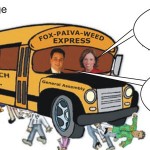Sometimes, It’s Enough to Hold the Line
At the end of an extremely stressful day, with the stress having to do with a substantial transaction that wouldn’t be nearly so stressful if our society were such that people were naturally open and fair, the urge to write by way of catharsis is very strong. Happily, as it happens, a perfect topic presented itself only yesterday.
I was driving to a meeting along one of Rhode Island’s secondary two-lanes-each-way highways, and some roadwork forced a lane merge for no more than 100 yards. The traffic, however, backed up many times that length.
To my driving experience, limited to the Northeast, Rhode Island is unique in such circumstances. A majority of people pull over and get in line as soon as they perceive that there’s going to be a merge. That action leaves the evacuated lane wide open for aggressive people who ought to be at the back of the line — let’s call them “scum” — to fly up to the front. Inasmuch as the courteous people who are in the line allow these scum to cut in, the empty lane never fills up, so taking advantage of the situation remains an option for the entire duration of the roadwork.
Living more than half of my life on the Big Apple end of New Jersey, where traffic is more a way of life than an inconvenience, I’d never seen this situation before. I think what must happen down in the Garden State is that enough of the people in line are brash and contemptuous of being abused that long lengths of them simply refuse to let the scum cut in. That freezes the open lane, perhaps with one cut-in allowed for every dozen cars in line, and eventually, the lane that would be open in Rhode Island fills to equilibrium, until, in New Jersey, those coming up on the traffic naturally spread out across all of the available lanes evenly.
When that happens, there’s no advantage to be gained in one lane over the other in the long term. The scum become distributed among everybody else, and by the time a group of cars gets to the actual merge, the drivers are well aware that everybody around them has been around them for the entire traffic jamb. They therefore are more willing to be charitable and allow a zipper-merge to work.
The transfer of perceived moral advantage in traffic is fascinating. In the Jersey scenario, the scum really have no moral claim against the folks who won’t let them in. By strict social rule, those folks will never make eye contact, but if the cutters were to tell the story, there’d be no question that the audience would lay blame on them.
When Rhode Islanders let the scum in, though, they pass an interesting dilemma back down the line. The right thing is to merge right away… to form the line as soon as it’s clear that there’s a reason to do so. But that makes everybody victims to the scum.
If we could all communicate telepathically, perhaps the ideal scenario would be for everybody to agree to stay in their lane at the same speed. That is, as soon as the requirement to merge appears, everybody should stay in his or her relative place in line, but across the highway, finally merging when the cones are reached. But that’s impossible to coordinate.
I’ve tended to take that on as a cause of one. Wherever my place should be, that’s where I stay, but in my own lane, with the length of empty road before me. Without fail, as soon as the remaining scum in front of my blockade have been absorbed, the line, which had previously been at a standstill, begins to move smoothly.
But as proven by their waving arms and the number of times that I’ve had to sneak on to side roads to avoid road rage once the obstacle had been passed, the scum apparently feel that the moral advantage has been passed to them. I am at fault, in their eyes, for preventing them from taking advantage of everybody else. (One guy chased me several miles — swerving behind me, slamming on brakes in front of me — until I made a last-minute swerve onto an exit ramp while he moved to cut me off again from the left.)
It occurred to me, yesterday, that this scenario is an excellent metaphor for the civic culture of Rhode Island.
Most people want to be fair and (more) to be free not to get involved with moral conundrums on a daily basis, so they accept that scum will be scum. We ignore it when people take advantage and don’t treat it as a reason to rearrange the system. We’ll badmouth the scum to the other people in our own car, but that’s as far as it goes. Behavior doesn’t change. And we end up with a long line with no movement whatsoever, while the got-mine crowd zips up to the front, virtually by invitation and other people who have to get somewhere take whatever exits appear.
And then, when people step forward to stand up to the scum, they are made to feel like the aggressors. They are, I suppose, to the extent that aggression is defined as a failure to be passive, but if it is defined as being the one first to choose to make a conflict inevitable, the perspective reverses.
Rhode Island needs a good dose of that reversal. And soon.


